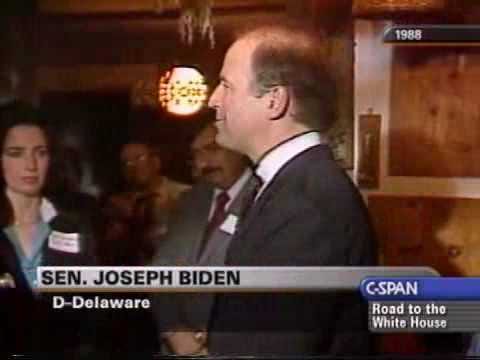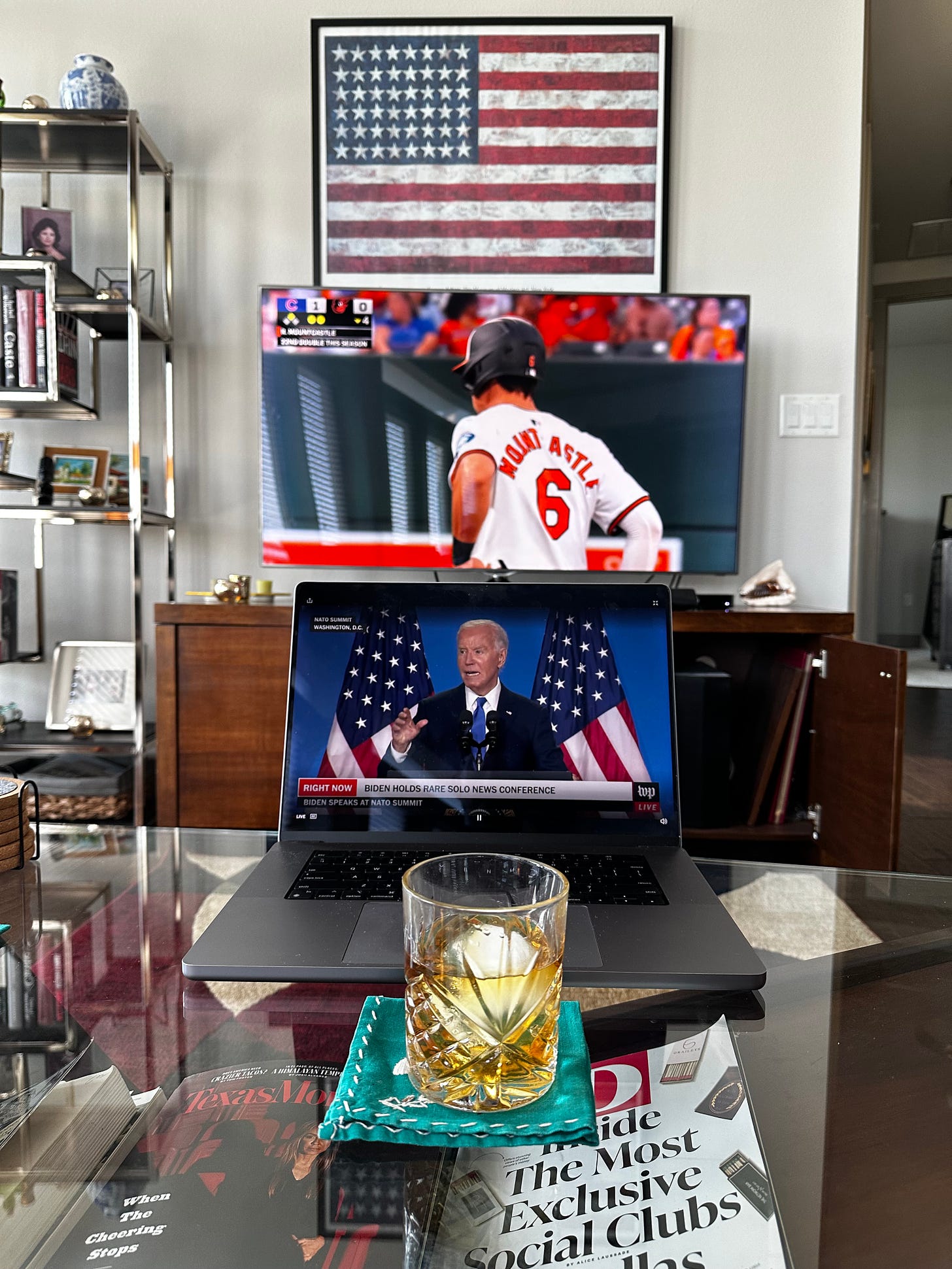Why Biden's campaign is acting like this
Every campaign is a reflection of the candidate's personality, and right now we're not getting the nicest Joe Biden
Welcome to the weekend edition of The Experiment, your official hopepunk newsletter. If you’d like to support my work, become a paid subscriber or check out the options below. But even if you don’t, this bugga free. Thanks for reading!
As soon as the reporter mentioned that the leadership of the United Auto Workers was concerned about his ability to win in November, a sinking feeling hit me. We were about to get the other Joe Biden, the Joe Biden I hadn’t seen since the Reagan administration. The question was barely out before we saw Biden spit back, “UAW just endorsed me, but go ahead.”
That wasn’t quite true, but his veracity didn’t matter as much to me as his seemingly out of character combative, peevish defensiveness. Suddenly his campaign made sense again.
I have worked on, managed, consulted for, and advised hundreds of campaigns, and the culture of every single one of them reflected the personality of the candidate. Campaigns do this unconsciously, and I guarantee you most operatives don’t know it’s happening, but it’s the best way I know to understand why a campaign does what it does, for better or worse.
When a candidate was unfocused, so was the campaign (and so was I). I drank more on campaigns when the candidate was an alcoholic. A friend told me that everyone on the Clinton/Gore campaign was sleeping around. In 1994, Ann Richards privately didn’t think George W. Bush deserved to run against her, and boy oh boy did our campaign drip with unattractive, snarky disdain (for which I am as guilty as anyone).
Every campaign reflected the personality of the candidate.
This is also true for positive qualities. Bill Clinton, who is such a gifted communicator that Barack Obama joked that he was going to appoint him “Secretary of Explaining Stuff,” ran a presidential campaign in 1992 that innovated new forms and tactics of media relations and information dissemination. And Obama, perhaps the best writer ever to occupy the Oval Office, ran a campaign gifted in storytelling.
Right now the Biden campaign is acting like it wants to start a bar fight with the Democratic Party, the media, and George Clooney. One campaign official insulted those who are upset at Biden’s diminished performance as the “bedwetting brigade,” and this was in a fundraising email. “I am worried about the cognitive abilities of the invertebrate professional panicking class,” said a White House official. Again, these are Biden folks insulting those who share an opinion held by most Democrats.
The Biden campaign is acting like it wants to start a bar fight with the Democratic Party.
This behavior makes no sense to normal people. Levi’s doesn’t advertise that their jeans make you look fat. Budweiser doesn’t call people in Alcoholics Anonymous quitters. Politics is the friends-making business, and Joe Biden is the original, glad-handing pol. Uncle Joey B, right? I have personally seen his kindness, solicitude and charm. And let me tell you, I’ve seen dozens of politicians try to act like decent human beings in public, and Biden was not faking.
So why is has the Biden campaign brain trust suddenly turned into a bunch of guys who seemingly can’t wait to cuss us out? The Biden campaign has changed because Joe Biden has changed. Rather, we are being revisited by a ghost of Joe Biden’s past.
In 1987, Biden, a 44-year-old senator, was running for the Democratic nomination along with Dick Gephardt, Gary Hart, Jesse Jackson, and Michael Dukakis. Reading over those names, you can see why Biden thought he had a shot. It was the first election I ever voted in and do not remember being too terribly inspired, though What It Takes: The Way to the White House, Richard Ben Cramer’s 1,047-page classic about the 1988 presidential campaign, made it all seem fascinating later.
According to the LA Review of Books:
Cramer spent years digging into the biographical nitty-gritty of the candidates more than most political reporters, and he came up with a deft, sure-footed, and unexpectedly engrossing chronicle of the all-too-human struggles taking place behind all the pomp and circumstance. What It Takes offered a forensic examination of the raw human facts of the candidates’ lives, offering portraits of how candidates see themselves in private, minutely observed narratives of how they acquired their houses, reputations, or war wounds.
We meet the grimly noble Bob Dole, a diffident but decent George H. W. “Poppy” Bush who is overwhelmed by the ruthlessness of his own party, the competent but underwhelming Michael Dukakis, fecklessly idealistic Richard Gephardt, blundering egghead Gary Hart, and the manically charismatic Joe Biden emerge as fully alive as the characters in a great novel. But Joe Biden is probably the most colorful and dynamic character in the book, even if at times he sounds a little nutty.
In real time, Biden didn’t cover himself in glory in 1987. There was a media feeding frenzy over a plagiarism scandal that wasn’t quite plagiarism as much as it was a scandal. He liked to quote British politician Neil Kinnock incessantly on the stump. Once, trying to shorten his remarks, he quoted Kinnock without attribution, seeming to some, though no one in attendance, to be passing off the words as his own. He also had to retake a citation class in law school. All of this was cast in the national press as a pattern of plagiarism, and Biden became a punchline before dropping out.
Cramer’s book was more sympathetic to the charming, enthusiastic, and excitable Biden.
Cramer’s portrait of Biden depicts a man in perpetual motion, who is all about the urgency of “making moves” — the italics being necessary to convey that pretty much everything Biden ever says is in italics. Emphatic language isn’t necessarily a surprising quality for a politician to have, but his incessant go-getting starts to make more sense when it ends up paying off in the end. Reagan-era Biden seems to run on well-honed instinct. As Cramer puts it, “[H]e can see it all in his head”: how to run for office, how to win, how to get into law school, how to keep from failing out, how to get the girl of his dreams. Ever since Biden was a little kid growing up in Pennsylvania he was a scrapper, known for never backing down, never shy about taking a daredevil bet.
Fundamentally, Cramer depicted Biden as decent.
“The whole thing would come down to character,” Cramer wrote. “One thing he knew: They would never take him apart on character — his basic honesty — his fabric as a man.”
For a long, long time—in 2008 when he ran first against and then with Obama, and again in 2020 when he talked about “winning the heart and, yes, the soul of America”—Biden’s campaigns reflected his decency rather than any particular ideology, policy, or vibe. The reason Dark Brandon worked as a meme was because it contrasted humorously with Biden’s fundamental decency. Joe Biden was so decent that his go-to insult was “malarkey.”
But there was a time he wasn’t decent. One time Joe Biden was a complete jerk.
In Oct. 1987—at a time when his campaign was defined by the plagiarism business—a reporter at a Democratic event in Claremont, New Hampshire, asked Biden what law school he attended and how well he did. Admittedly, the question sounded challenging and provocative, though the content of the question isn’t exactly “When did you stop beating your wife?” But the reporter might as well have been asking about the UAW meeting to reconsider his candidacy for as ferociously as Biden punched back.
Joe Biden was so decent that his go-to insult was “malarkey.”
“I think I have a much higher I.Q. than you do I suspect,” said Biden, and it sounds worse when you hear it. Biden doesn’t sound decent. He sounds like a word that I can’t bring myself to use to describe Joe Biden. I was in high school when this made the news, and for a long time this was the image I had in my head and probably why I was so happy to embrace his latter-day Uncle Joey B ice cream-eating phase.
Biden did not stop after insulting the reporter.
“I went to law school on a full academic scholarship, the only one in my class to have a full academic scholarship,” he said. “In the first year of the law school, I decided I didn’t want to be in law school and ended up in the bottom two-thirds of my class. And then I decided to stay, went back to law school, and in fact ended up in the top half of my class.”
The fact that he went to law school on an academic scholarship is true, but the rest is not. The resulting “Biden lies again” story was the last thing that happened before he ended his campaign. But what the most honest thing about the tirade was the thin-skinned, aggrieved emotion behind it. Biden never faked decency, but neither did he fake being a prick.
And now this other Biden, the one who doesn’t lead with humor, love, and decency, is back. This Biden reacts instead of responding. This Biden wants to embarrass and insult those who question him. And this Biden explains why his campaign and now so many of its online defenders have adopted a “with us or against us” attitude with those whose votes will be needed to beat Trump in November.
There are smart people making credible, logical arguments both for and against him staying in the race. I’m not here to make the case for either, though I will say if I were Biden I could end this by saying “Anyway” and then meandering through a sentence until I felt like stopping. It’s possible that the Biden campaign is right and that he, and only he, can defeat Trump. To that I’d say perhaps, but not this Joe Biden and not this Biden campaign.
Jason Stanford is a co-author of NYT-best selling Forget the Alamo: The Rise and Fall of an American Myth. His bylines have appeared in the Washington Post, Time, and Texas Monthly, among others. Follow him on Threads at @jasonstanford, or email him at jason31170@gmail.com.
Further Reading
I had 20 hours in a car with my son last weekend, and he didn't drive me crazy.
We set up a merch table in the back where you can get T-shirts, coffee mugs, and even tote bags now. Show the world that you’re part of The Experiment.
We’ve also got a tip jar, and I promise to waste every cent you give me on having fun, because writing this newsletter for you is how I have fun.
Buy the book Texas Lt. Gov. Dan Patrick banned from the Bullock Texas History Museum: Forget the Alamo: The Rise and Fall of the American Myth by Bryan Burrough, Chris Tomlinson, and myself is out from Penguin Random House. The New York Times bestseller is out in paperback now!










You’ve explained the Biden team’s strategic blunder that I couldn’t figure out. It makes no sense that they are going out of their way to insult and alienate the folks they need to come home to Joe. I believe their insults have done as much damage as the debate performance. It’s all painful to watch.
Well known adage that you get what you ask for. A large part of America and about all media wants a clown show in politics. Biden, who did not do bad at the debate- go back and take it apart minute by minute and no one has provided an issue other than he “looked bad.” Shame on them. And Biden and all his folks have to listen to the insistent drum of BS. I’m sick of it and I’m sure he is furious. He’s been too kind in response.